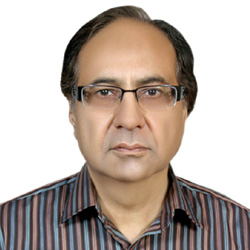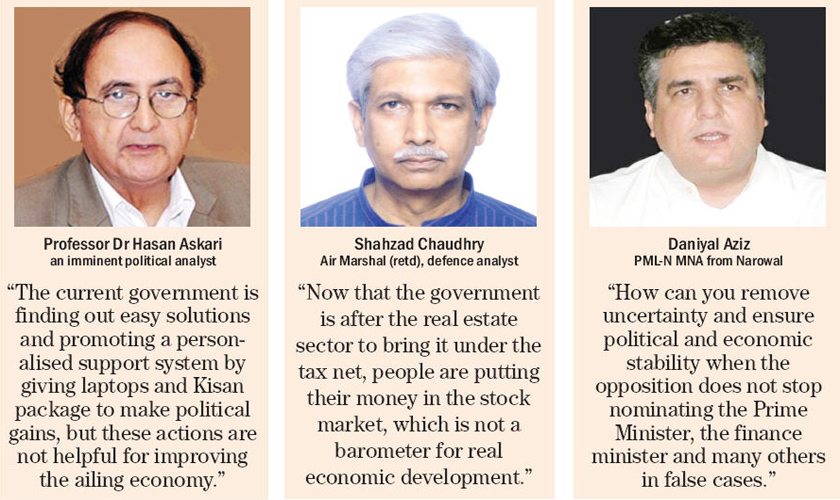INSIGHT
The uncertainty triggered by Panama leaks is refusing to die down, with its major casualty being the country’s struggling economy for the past 10-month period. The issue gets compounded, as most of the ministries and their allied departments are hardly working and are waiting for the outcome of the case in the Supreme Court of Pakistan.
 It appears that the whole government machinery has been geared to defend the prime minister and his family, without realising that it is contributing to increasing the political and economic instability across the country.
It appears that the whole government machinery has been geared to defend the prime minister and his family, without realising that it is contributing to increasing the political and economic instability across the country.
The Panama scandal that hit Pakistan Stock Exchange with market capitalisation loss of $3 billion in just seven days of its occurrence last year continues to hurt the economy. Local and foreign investors are looking at the Supreme Court so that they can decide about their future business and industrial plans.
Except for China-Pakistan Economic Corridor (CEPC), progress on other development projects and economic activities is witnessing delays and stagnation because of indecisions and too much focus on emerging political developments.
Senior officials of World Bank, International Monitory Fund (IMF), and the Asian Development Bank (ADB) believe that political uncertainty remains an important risk factor in Pakistan, while the Chinese investment is contingent on improvement in security and the fulfilment of institutional regulatory, logistical, and other commitments made by Islamabad.
Ever since Panama Papers were revealed in April 2016, long term fiscal sustainability has been getting unachievable due to declining economic indicators. Things are turning worse in the absence of growing political differences between the government and the opposition parties.
“How can you remove uncertainty and ensure political and economic stability when the opposition does not stop nominating the Prime Minister, the finance minister and many others in false cases,” Daniyal Aziz, an important Pakistan Muslim League-Nawaz (PML-N) leader and MNA from Narowal, asked.
Moreover, when the officials of National Accountability Bureau (NAB), Federal Board of Revenue (FBR), Securities and Exchange Commission of Pakistan (SECP) and other departments were summoned to the court every day, uncertainty was bound to further increase, the minister pointed out.
“Therefore, don’t hold the government responsible and blame Imran Khan and his party for heightening this uncertainty. And we do realise it is not good for the economy,” he added. These officials, Aziz said, have to stand in the Supreme Court and other courts from morning to evening due to which they were unable to attend their offices and hence contribute to any betterment of the country.
He said the Prime Minister was accused of money laundering and tax evasion, though, his name did not appear in International Consortium of Investigative Journalists (ICIJ) papers. “Has anybody asked Imran Khan for his offshore tax liability,” he said.
The PML-N leader said the Pakistan Tehreek-e-Insaf (PTI) and other opposition parties were trying to sabotage the economic agenda of the government by running the bogy of Panama leaks.
Professor Dr Hasan Askari, an imminent political analyst, however, believed that politics and economy were inter-linked and delays were hurting long term decision making. In fact these delays have undermined economic development because of the uncertain political environment arising out of the Panama leaks.
He regretted that there was no real economic revival, notwithstanding government’s hollow slogans, and had there been so, the ruling party would have not extended relief packages one after the other. “Why do you need to offer a package to any sector if the economy is on a strong footing,” Askari asked, and added that the agriculture package, tax amnesty package, and now export package to the textile exporters showed that all was not well on the economic front.
Minimum political prerequisites, he emphasised, were must to manage positive turnaround in the economy that has been plagued by the increasingly uncertain political environment in Pakistan. “The current government is finding out easy solutions and promoting a personalised support system by giving laptops and Kisan package to make political gains, but these actions are not helpful for improving the ailing economy,” he said.
Dr Askari said that there was no real foreign direct investment (FDI) nor there were any local investments, precisely because of not having a favourable environment, which could only be maintained when there was no political uncertainty.
Another prominent political and defence analyst, Air Marshal (retd) Shahzad Chaudhry was of the view that uncertainty prevailed because politicians were pursing their own political interests, with the result that the economy was suffering heavily. Politics, he pointed out, should be for economic purposes and not for personal gains. “All policies have economic consequences and rulers perhaps are not realising that the current uncertainty coming out of Panama gate is suicidal for our economy,” he added.
The retired air marshal said that the government needed to focus on economic activities in addition to CPEC which would certainly help improve the decaying infrastructure and overcome energy shortages. People must be provided with jobs and poverty must be alleviated for fixing the economy, he said, and added that it was not possible without building the industrial base and strengthening poor macroeconomic indicators.
Only the stock market had been witnessing a boost, where people were making portfolio investments only to whiten their black money. “Now that the government is after the real estate sector to bring it under the tax net, people are putting their money in the stock market, which is not a barometer for real economic development,” the retired air marshal said.
The government needed to focus on achieving political stability that would automatically lead to economic stability. Without concentrating on the knowledge-based economy, promoting IT, education and health services, there was no concept of reviving the economy. “The million dollar question now is, can this be achieved in the presence of uncertainty, particularly being witnessed ever since the appearance of Panama gate,” Chaudhry said.
The continued political instability has caused huge losses to the economy, in addition to $120 billion loss that came in the wake of 9/11, which also brought terrorism and religious extremism in Pakistan. This is what is being experienced more in Balochistan now.
The province has no stable political and social conditions, despite having its own strategic importance due to its deep sea route. It has the world’s third largest gold and cooper reserves, gas reserves and different minerals, yet it’s the poorest and least developed area in Pakistan. Is it not ironical that only eight districts in Balochistan, which provides natural gas to Pakistan since 1952, have access to natural gas?
The situation in Khyber Pakhtunkhwa has largely improved in terms of overcoming the menace of terrorism - thanks to Zarb Azab and other military operations in the tribal regions. Sindh did not see much terrorism but Punjab had been its victim, though one does not see major incidents of violence there anymore. So far, the ruling PML-N had been resisting military action in the province to avoid backlash from sectarian outfits. Punjab government has been accused of maintaining relations with outlawed sectarian groups by its critics including the military authorities, who always felt compelled to have this operation in Punjab, from where the Punjabi Taliban had been operating and joining hands with their allies in Khyber Pakhtunkhwa and Balochistan.
Today, there is a consensus that political instability, military interventions, religious exploitation, economic deprivation, and social injustice remained rampant during most of 70 years of Pakistan’s history. The major reasons of ever increasing corruption, political instability now coupled with uncertainty, poverty, unequal structure of society, unemployment, lack of accountability, weak political and democratic institutions, bad governance, and the absence of rule of law continue to be the biggest unresolved challenges that are linked to achieving any peace vital for the economy.

Professor Dr Hasan Askari
an imminent political analyst
“The current government is finding out easy solutions and promoting a personalised support system by giving laptops and Kisan package to make political gains, but these actions are not helpful for improving the ailing economy.”
Shahzad Chaudhry
Air Marshal (retd), defence analyst
“Now that the government is after the real estate
sector to bring it under the tax net, people are putting their money in the stock market, which is not a barometer for real economic development.”
Daniyal Aziz
PML-N MNA from Narowal
“How can you remove uncertainty and ensure political and economic stability when the opposition does not stop nominating the Prime Minister, the finance minister and many others in false cases.”
There are different thoughts and approaches to get rid of growing uncertainty. Many believe that the outcome of the Panama leaks case will clear the dust and greatly help remove uncertainty. Others believe this is not as simple, and that it will affect the future political discourse in the wake of 2018 elections, for which political parties are already geared up and have started evaluating the situation in terms of forging different alliances.
Since the election year is approaching, the government is believed to have decided to quicken the release of development funds, especially to federal and provincial legislators in the third and fourth quarters of the current financial year.
The first and second quarters had witnessed significant reduction in releases aimed at containing fiscal deficit that will end up near five to six percent in 2016-17. The government has borrowed over Rs1 trillion alone from the central bank to run its financial affairs, due to only six percent growth in revenue.
Now, when large-scale manufacturing (LSM) seems to have collapsed and just grew by two percent in July-October, and tax collection is up by only two percent in the first five months of the current fiscal, real economic turnaround looks like a distant dream.
Other economic indicators, including FDI, remittances, export, agriculture, fiscal and current account deficits are falling behind the target, while the total debt and liabilities have risen to a horrifying Rs22 trillion, which also includes $73 billion external debt.
The oversight by the IMF is no more there, which otherwise would have forced the government to borrow less, improve revenues, contain fiscal deficit and complete key structural reforms, aimed at removing distortions from the economy. The failure in adequate tax mobilisation is seriously hurting the economy, forcing the government to continue borrowing recklessly both from internal and external resources.
Nearly four years long deepening political and economic instability spearheaded by the opposition and failure of the government to come to terms with its political opponents is a serious challenge for the rulers. Even if they are rescued by the Supreme Court over Panama gate, they may not have easy sailing to win 2018 elections, as the fruits of their policies did not reach the public at large. The issue becomes all the more important in the presence of mounting uncertainty that is hurting the image of the country both in and outside Pakistan.
The writer is a senior journalist based in Islamabad